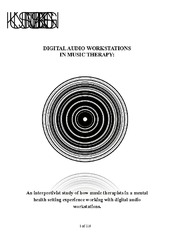Digital audio workstations in music therapy: An interpretivist study of how music therapists in a mental health setting experience working with digital audio workstations.
Master thesis
Permanent lenke
https://hdl.handle.net/1956/22443Utgivelsesdato
2019-12-18Metadata
Vis full innførselSamlinger
Sammendrag
The use of digital audio workstations (DAW) in music therapy is has been little researched. This interpretivist study explores how music therapist in a mental health setting experience the use of DAWs in their praxis. The aim of the study was to give praxis accounts of using DAW in therapeutic contexts, for the benefit of other music therapists DAWs, and contribute to the discourse on music therapy and music technology. The empirical data material was collected through four semi-structured interpretivist interviews and analysed using a hermeneutic approach and social constructivist perspective toward epistemology. Findings were categorised into four major themes: 1) a structuring resource, 2) aesthetic experience, 3) using clients strength and resources and, 4) making things and connectedness. The findings suggest that therapeutic goals such as agency, empowerment and mutual collaboration and constructing positive identities are facilitated and reinforced by creative processes using DAWs. Significant findings were discussed in relation to other research on music therapy and DAWs and relevant humanistic theory surrounding the field of mental health and mental health recovery.
